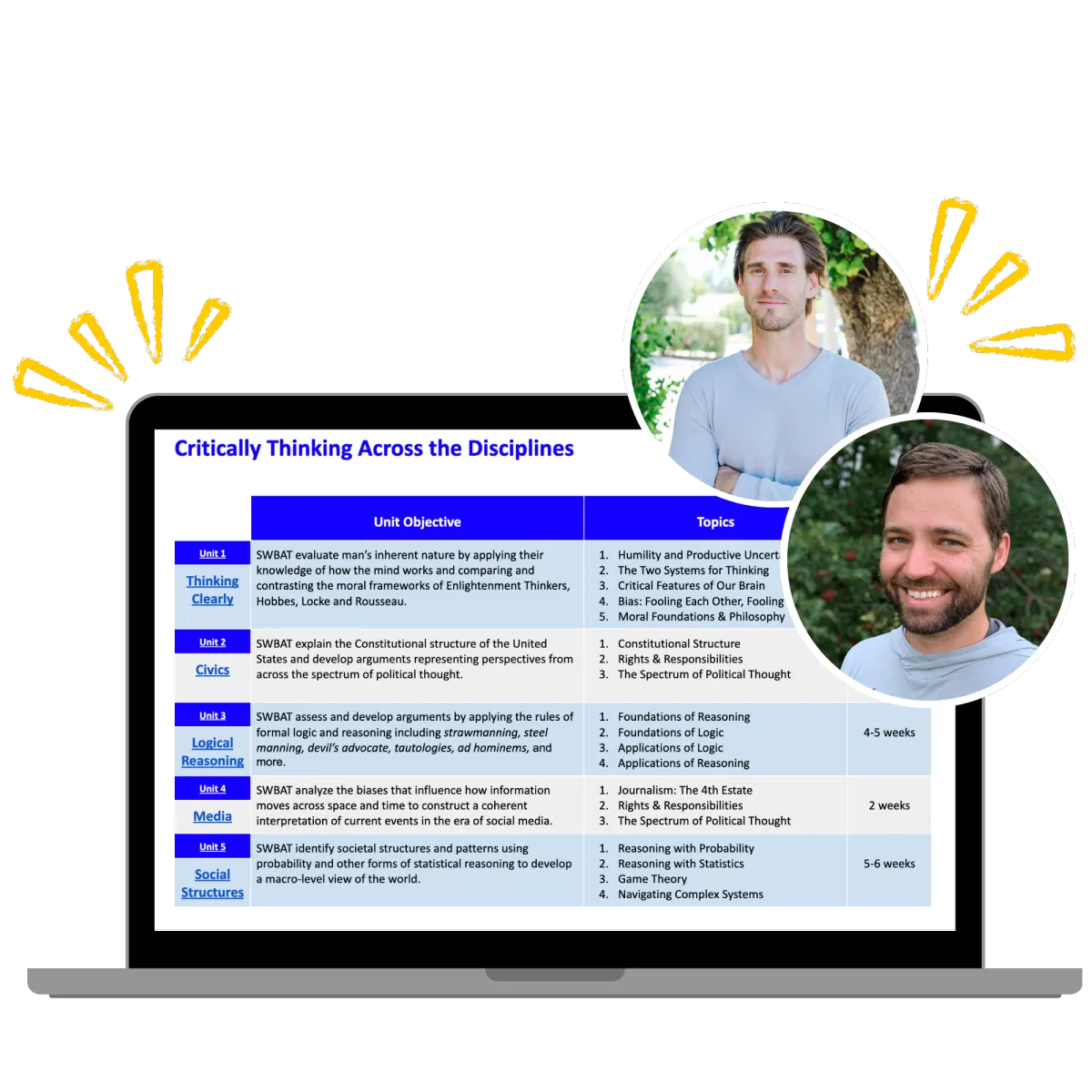
Critical Thinking
Across The Disciplines
Foster Your Students' Critical Thinking
Skills With Our Free Curriculum!

FUNDED BY

Developed by active high school humanities and STEM teachers, Zach Cresswell and William Reusch, this free critical thinking curriculum is a game-changer for K-12 education.
Generously funded by Heterodox Academy, this comprehensive curriculum equips students with essential critical thinking skills that are desperately needed in today's society.
Flexible and adaptable, this curriculum is designed to integrate seamlessly into your existing courses as a supplemental element. It provides a framework and a curated collection of resources, allowing you to make it your own and tailor it to the unique needs of your students.
We understand that educators often feel shackled to rigid curricula, but with this curriculum, you have the freedom to eliminate or extend content, encourage deeper classroom discussions, or incorporate additional resources.
Grade Recommendation: 11th & 12th grade
Estimated Instructional Time: Varies based on pacing, reading resources & modifications made.
What's included ...
These are some of the features and resources included in the curriculum:
Comprehensive Lessons & Activities: The curriculum provides a structured framework with detailed lessons and activities designed to promote critical thinking skills.
Recommended Resources: The curriculum suggests relevant books and resources to supplement learning, including titles such as "Thinking, Fast and Slow" by Daniel Kahneman and "You Are Not So Smart" by David McRaney.
Teacher Guides: The curriculum includes teacher guides that provide additional support, explanations, and guidance for implementing the lessons effectively
Slide Presentations: Slide presentations accompany various lessons, offering visual aids and engaging content to enhance student understanding.
Videos: The curriculum incorporates video resources, such as videos on System 1 and System 2 thinking, to further illustrate key concepts and engage students.
Worksheets and Activities: Various worksheets and activities are included to reinforce learning and encourage students to apply critical thinking skills in practical scenarios.
Key Terms: The curriculum provides a list of key terms, ensuring students grasp important concepts and develop a shared vocabulary related to critical thinking.
Assignment Options: The curriculum offers different assignment options, including debates, discussions, and written assignments, allowing teachers to tailor activities to their students' needs and preferences.
Our curriculum is designed to equip educators with a well-rounded and easily accessible toolkit to foster critical thinking skills among their students and promote engaging and thought-provoking discussions and activities.
What information is covered in this curriculum?
Featuring a breakdown of five comprehensive units, our curriculum covers a wide range of critical thinking topics that empower students to evaluate, analyze, and reason effectively. Let's take a closer look:
Unit 1 - Thinking Clearly: Exploring Human Nature and Moral Frameworks
In this unit, your students will delve into the complexities of human nature by studying the works of Enlightenment Thinkers, including Hobbes, Locke, and Rousseau. They will apply their understanding of how the mind works and develop the skills to evaluate and compare different moral frameworks.
Key topics covered include:
- Humility and Productive Uncertainty: Fostering an open mindset for critical thinking.
- The Two Systems for Thinking: Understanding the dual processes of intuitive and deliberate thinking.
- Critical Features of Our Brain: Unveiling the intricacies of cognitive processes.
- Bias: Fooling Each Other, Fooling Ourselves: Recognizing and overcoming cognitive biases.
- Moral Foundations & Philosophy: Exploring the ethical dimensions of human behavior.
Estimated Duration: 5-6 weeks
Unit 2 - Civics: Understanding the Constitutional Structure and Political Thought
In this unit, your students will gain a deep understanding of the Constitutional structure of the United States and develop the ability to represent perspectives from across the spectrum of political thought.
Key topics covered include:
- Constitutional Structure: Exploring the foundations of the United States' governmental system.
- Rights & Responsibilities: Understanding the rights and duties of citizens.
- The Spectrum of Political Thought: Analyzing diverse political ideologies.
Estimated Duration: 3 weeks
Unit 3 - Logical Reasoning: Mastering Formal Logic and Reasoning Techniques
In this unit, your students will sharpen their logical and reasoning skills by applying the rules of formal logic. They will learn techniques such as straw manning, steel manning, devil's advocate, tautologies, ad hominems, and more.
Key topics covered include:
- Foundations of Reasoning: Building a solid foundation in the principles of reasoning.
- Foundations of Logic: Understanding the fundamentals of logical thinking.
- Applications of Logic: Applying logical reasoning in different contexts.
- Applications of Reasoning: Developing persuasive arguments through effective reasoning.
Estimated Duration: 4-5 weeks
Unit 4 - Media: Analyzing Media Bias and Current Events
In this unit, your students will critically analyze the biases that influence the flow of information in the era of social media. They will construct a coherent interpretation of current events and understand the role of journalism as the fourth estate.
Key topics covered include:
- Journalism: The 4th Estate: Examining the role of journalism in society.
- Rights & Responsibilities: Understanding the rights and responsibilities of journalists and media consumers.
- The Spectrum of Political Thought: Exploring how different perspectives shape media narratives.
Estimated Duration: 2 weeks
Unit 5 - Social Structures: Unveiling Societal Structures and Patterns
In this unit, your students will utilize probability and statistical reasoning to identify societal structures and patterns, enabling them to develop a macro-level view of the world.
Key topics covered include:
- Reasoning with Probability: Understanding the role of probability in making informed decisions.
- Reasoning with Statistics: Analyzing data and drawing meaningful conclusions.
- Game Theory: Exploring strategic decision-making in different scenarios.
- Navigating Complex Systems: Understanding complex systems and their impact on society.
Estimated Duration: 5-6 weeks